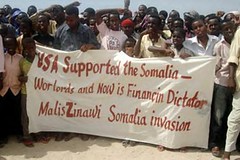 While studying abroad at the University of Havana in 2003, I had a conversation with a Cuban student who expressed to me some mocking trepidation that the U.S. embargo (or "blockade," in Cuban parlance) would soon be lifted.
While studying abroad at the University of Havana in 2003, I had a conversation with a Cuban student who expressed to me some mocking trepidation that the U.S. embargo (or "blockade," in Cuban parlance) would soon be lifted."Then we're in real trouble," he related. "All the computer software we have down here is pirated, and if the U.S. finds out, they'll take it away from us."
Four years later, he clearly still has nothing to worry about.
Stumbling into its 46th year, the beleaguered U.S. policy of "stand[ing] with the Cuban people as they stand up for their liberty" shows no signs of fading away any time soon - indeed, in spite of opposition from virtually the entire world (minus the usual dependencies of Israel, Palau, and the Marshall Islands, per a 2006 UN vote), agricultural interests in the U.S. who want to increase trade with the island, and many members of Congress, U.S. policy towards Cuba has taken an even more draconian turn in recent years.
In 2004, Washington implemented changes preventing Cuban Americans from visiting anyone but immediate family members on the island, and limiting how often they can do so (curiously, sans protest from Focus on the Family or other "family values" crusaders). Study abroad programs for U.S. university students were mostly banned.
In 2006, the U.S. announced "more vigorous investigations and more aggressive prosecutions" of embargo-violators, real scum of the earth who dare to visit the island to deliver humanitarian aid, or, say, because they don't think that the government has the right to tell them where not to travel. Tellingly, a 2004 investigation by the Associated Press found that "The Treasury Department agency entrusted with blocking the financial resources of terrorists has assigned five times as many agents to investigate Cuban embargo violations as it has to track Osama bin Laden's and Saddam Hussein's money."
Though critiques of U.S. policy towards Cuba are obvious, and accepted by basically every nation in the world - Cuba isn't quite a "tropical gulag," and it's wrong in principle to force food and medical scarcities on a population for geopolitical gain - it is especially significant in this case the extent to which U.S. policy contradicts U.S. policy goals.
While its deleterious effects are very real, the U.S. embargo/blockade functions, in essence, as Cuba's "War on Terror": a blanket excuse Havana can use for any related or unrelated problem in the country (dissidents? food shortages?), and an automatic justification for whatever repressive measures the government proposes.
One could argue that Washington simply doesn't get the point - that its policies are propping up the Cuban government - though the political establishment in the U.S. clearly understands the idea of fear mongering to beat its own population into submission.
In reality, the embargo/blockade's endurance is better explained by the fact that there is a potential outcome for U.S. imperial interests that is far more dangerous than strengthening the hand of the Cuban government - it's admitting that the embargo/blockade against Cuba hasn't worked, and in the process giving other poor nations the idea that they too can outlast or overcome superpower assault.
Though the embargo/blockade clearly strengthens the Cuban government in the ways mentioned above, it will thus stick around as long as the price for getting rid of it is the empire's aura of invincibility.



